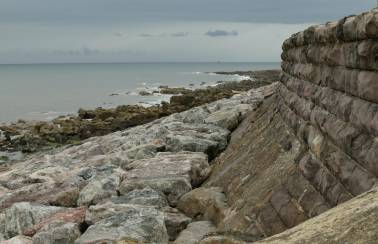AGGREGATE INDUSTRIES BACKS COLLABORATIVE APPROACH TO FLOOD AND COASTAL DEFENCE
Amid recent warnings that Britain faces an unprecedented threat from flooding and coastal erosion, Aggregate Industries is reminding flood planners of the need for early intervention, collaborative working and better use of materials for defence measures.
Earlier this week, the Environment Agency (EA) announced plans to give communities more control over how they prepare for and respond to the escalating threat of flooding and coastal erosion posed by climate change.
This includes providing better access to traditional defences and sustainable drainage systems, alongside designing and adapting existing properties and new developments so they can recover quickly from a flood.
Richard Allen, Specialist Aggregates Sales Manager at Aggregate Industries, said: “We welcome the EA’s plans to develop consistent standards for flood and coastal resilience across the country. However, it is vital that local authorities take pre-emptive action now and begin reviewing their flood defence strategies to understand how to best to tackle the growing risks from climate change.
“In addition, collaborative working between local government, contractors and even housing developers on the design and retrofit of properties will also be essential in protecting British homes, businesses and infrastructure against the devastating impact of more frequent, intense flooding and sea level rise.
“With the EA estimating that an average of £1bn will need to be invested each year in traditional flood and coastal defences and natural flood management, a joined up approach may prove more cost-effective in the long run – after all, it’s far cheaper to prevent flood damages than rectify them.”
Core to this approach is leveraging the latest construction materials solutions available to aid coastal and flood defence measures – such as the appropriate use of aggregates. This includes natural rock such as rock armour, rip-rap and gabion which are widely specified by the Environment Agency and consulting engineers for river revetment and diversion contracts.
Richard added: “In such situations, natural rock is more harmonious with the environment than steel piling and longer lasting than timber as it forms an effective interlock between blocks and can be achieved on either a coursed or random joint pattern. Key to the success of any flood defence strategy is to ensure that the right specification and size of rock is used and more importantly, available before, during and after any extreme weather events.”
Aggregate Industries’ market-leading flood and fluvial services include an extensive range of water management products suitable for flood resilience, prevention, alleviation and defence in emergency rapid response situations. It offers nationwide coverage, including through its new joint venture business SeaRock, which delivers directly from the Glensanda quarry to the coast by sea.
Press contacts
-
Telephone
01530 510066
-
Email
Aggregate Industries are proud to offer a range of Flood and Sea Defence aggregates.
- Aggregates Industries Creates Bespoke Low-Carbon ECOPact Max+ Concrete for Iconic Hope Sculpture at COP26
- Aggregate Industries brings together its Manchester readymix offering and Stalybridge Readymix under SRM brand
- London concrete’s carbon neutral ECOPact Concrete used at landmark Watford development
- Aggregate Industries expands its low carbon concrete product range with the launch of ECOPact Prime AS
- Aggregate Industries launches UK’s first ever commercially available biogenic asphalt







